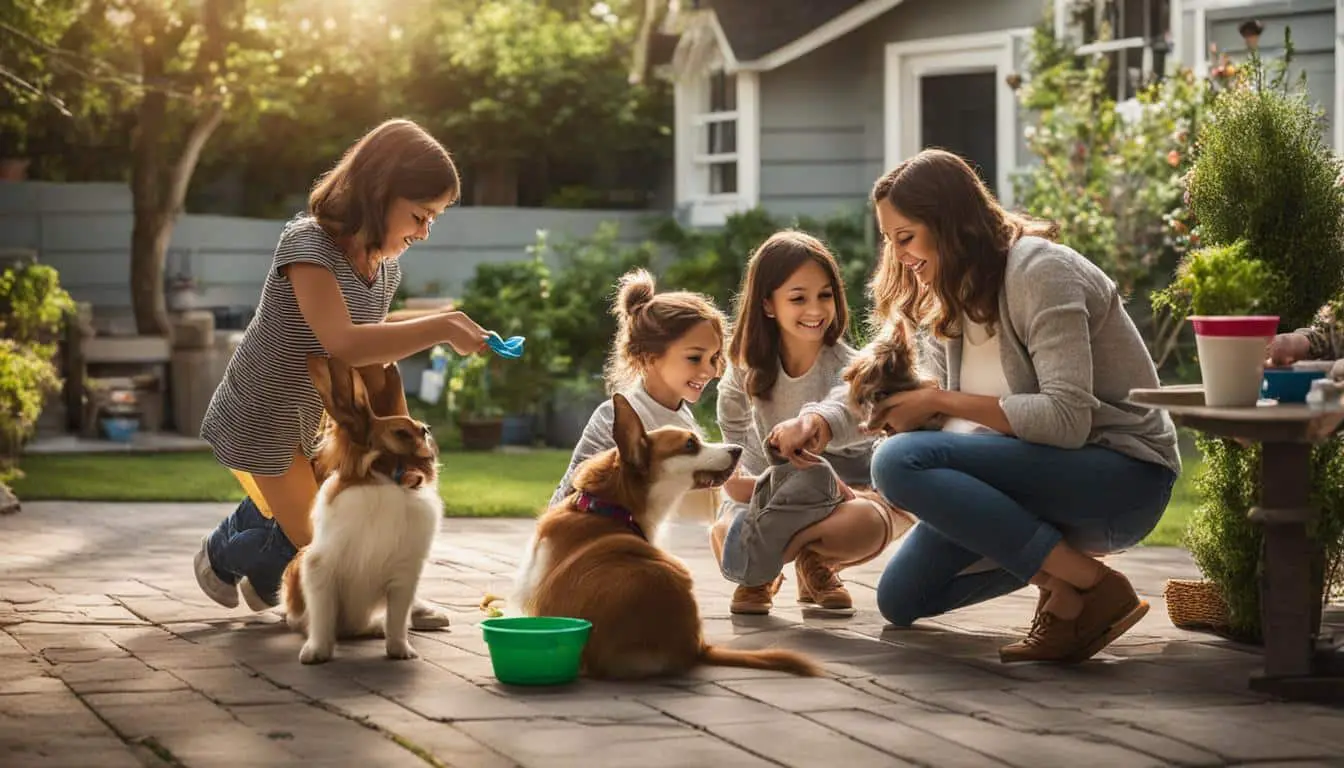
Responsible Pet Care: A Family’s Guide
Adopting a pet can be a rewarding experience for the entire family. Not only do you provide a loving home for a furry friend, but you also teach your children about responsibility and compassion. However, owning a pet comes with important responsibilities that should not be taken lightly.
Creating a happy home for your pet requires careful consideration and commitment. From providing daily care to ensuring their well-being, being a responsible pet owner is crucial for the happiness and health of your four-legged companion.
In this guide, I will walk you through the essential responsibilities of pet ownership, helping you understand what it takes to provide the best care for your family pet. So, let’s dive in and learn how to create a loving and nurturing environment for your furry friends!
Key Takeaways:
- Adopting a pet is a life-saving decision and supports animal welfare.
- Responsible pet ownership involves lifelong care and commitment.
- Providing appropriate healthcare, a suitable environment, and identification are essential responsibilities.
- Socialization, training, and exercise contribute to your pet’s well-being.
- Grooming, regular veterinary checkups, and emergency planning are vital for a happy and healthy pet.
The Responsibilities of Pet Ownership
Owning a pet is a privilege that comes with lifelong care and various responsibilities. When welcoming a furry friend into your home, it is essential to consider several factors to ensure their well-being and happiness. Here, I will outline the key responsibilities that come with being a pet owner, including selecting a suitable pet, investing time and money, providing an appropriate environment, and complying with local ordinances.
Selecting a Suitable Pet
Before bringing a pet home, it is crucial to choose one that is compatible with your home and lifestyle. Consider factors such as size, activity level, and temperament that align with your family’s needs and capabilities. Research different breeds or consult with adoption centers to find a pet that will thrive in your care.
Investment of Time and Money
Being a responsible pet owner requires a significant investment of both time and money. Pets require daily care, attention, and companionship, which can include feeding, grooming, exercise, and playtime. Additionally, veterinary care, vaccinations, preventive treatments, and emergency medical expenses should be budgeted for.
Providing an Appropriate Environment
Creating a safe and suitable environment for your pet is essential for their well-being. Ensure they have access to clean water, nutritious food, and a comfortable shelter. Provide appropriate bedding, toys, scratching posts, and other enriching activities to keep them mentally stimulated and physically active.
Identification and Registration
Responsible pet ownership involves proper identification and registration of your pet. This includes microchipping them so that they can be easily identified if lost and ensuring they wear an identification tag with your contact information. Additionally, it is important to register your pet with local authorities and comply with any licensing requirements.
Compliance with Local Ordinances
Every locality has specific rules and regulations concerning pet ownership. It is your responsibility to familiarize yourself with these ordinances, which may include leash laws, noise regulations, waste disposal guidelines, and restrictions on certain breeds or species. Adhering to these regulations not only ensures the safety of your pet but also promotes a harmonious relationship with your community.
“Responsible pet ownership involves committing to caring for your pet throughout its entire life and prioritizing their well-being.”
By being a responsible pet owner, you not only ensure the well-being of your pet but also contribute to the management of overpopulation and the overall welfare of the community. Remember that owning a pet is a lifelong commitment that requires love, care, and dedication. With responsible pet ownership, you can provide a fulfilling and happy life for your beloved companion.
| Responsibility | Description |
|---|---|
| Selecting a Suitable Pet | Consider size, activity level, and temperament to find a pet that aligns with your family’s needs. |
| Investment of Time and Money | Allocate time and budget for daily care, veterinary expenses, and emergency situations. |
| Providing an Appropriate Environment | Offer a safe and stimulating environment with proper food, water, shelter, and enrichment activities. |
| Identification and Registration | Microchip your pet and ensure they wear identification tags with your contact information. Register them with local authorities. |
| Compliance with Local Ordinances | Familiarize yourself with and abide by local pet ownership regulations, including licensing and leash laws. |
Essential Care for Your Pet
Taking care of your pet goes beyond meeting their basic necessities. As a responsible pet owner, it is crucial to prioritize their overall well-being through preventive and therapeutic healthcare, socialization and training, waste disposal, exercise and mental stimulation, and emergency planning.
Preventive and Therapeutic Healthcare
Consulting with a veterinarian and following their recommendations is essential for keeping your pet healthy. Regular check-ups, vaccinations, and preventive treatments such as flea and tick prevention can help prevent illnesses and ensure your pet’s overall well-being.
Socialization and Training
Socializing your pet from an early age is key to their well-being and the well-being of others. Proper socialization helps them feel comfortable in various environments and reduces the chances of behavioral issues. Additionally, investing in training sessions can promote obedience, strengthen your bond, and create a harmonious relationship between you and your pet.
Waste Disposal
Responsible pet owners diligently clean up after their pets to maintain cleanliness and hygiene. Whether you have a dog that requires walks or a cat with a litter box, proper waste disposal is crucial for the well-being of both your pet and the environment.
Exercise and Mental Stimulation
Regular exercise is vital for your pet’s physical health and mental well-being. Engaging in activities such as playtime, interactive toys, and daily walks helps them burn off excess energy, maintains a healthy weight, and stimulates their minds.
Emergency Planning
Planning for emergencies is a crucial part of responsible pet ownership. Prepare an emergency kit that includes essential supplies like food, water, medication, and identification documents. Having a plan in place for evacuation or temporary sheltering ensures your pet’s safety during unforeseen events.

By prioritizing preventive and therapeutic healthcare, socialization and training, waste disposal, exercise and mental stimulation, and emergency planning, you can provide the best care for your beloved pet and ensure their well-being for years to come.
Grooming and Identification
As a responsible pet owner, I understand the importance of providing proper care for my furry friend. This includes training and engaging playtime to strengthen our bond and ensure their well-being. Daily walks are an integral part of their exercise routine and socialization, allowing them to explore the world and interact with other dogs and people. During these walks, I always make sure to clean up after my pet, keeping the environment clean and hygienic for everyone.
Grooming plays a significant role in maintaining a pet’s overall health and appearance. Regular bathing, ear cleaning, brushing, and nail trimming are essential grooming practices that help prevent skin issues, ear infections, and overgrown nails. By devoting time to grooming, I not only enhance my pet’s physical well-being but also establish a routine that strengthens our bond.
“Grooming is not just about physical appearance; it is about showing love and care for your pet.”

Microchipping is a vital step in responsible pet ownership. It involves inserting a tiny microchip under their skin, which contains unique identification details. This permanent identification greatly increases the chances of being reunited with my pet if they ever get lost. It provides peace of mind, knowing that even if their collar or tags come off, they can still be identified and returned safely.
Routine veterinary checkups are crucial to ensure my pet’s overall health and well-being. During these checkups, comprehensive examinations and bloodwork are conducted to monitor their health, detect any underlying issues, and address them promptly. Regular visits to the veterinarian help prevent and manage potential health problems, ensuring that my pet remains happy and healthy for years to come.
Conclusion
Responsible pet ownership is the foundation for ensuring the well-being and happiness of our furry family members. By adopting a pet and embracing the responsibilities that come with it, we can create a loving and nurturing environment that promotes a healthy and fulfilling life for our pets.
Caring for our pets goes beyond providing their basic needs. We must actively engage in their essential care, such as ensuring they have a balanced diet, regular exercise, and mental stimulation. Training and socialization are vital for their development and the safety of others. Regular veterinary checkups and grooming sessions help maintain their overall health and well-being.
Being a responsible pet owner not only benefits our pets but also strengthens the bond within our families. The joy and companionship they bring are immeasurable, making our homes happier and more fulfilling. With the knowledge and guidance provided in this comprehensive family’s guide, you can confidently navigate the journey of responsible pet ownership and create a harmonious and loving environment for your beloved pets.
FAQ
Why is responsible pet care important for a family?
Responsible pet care ensures the well-being of your furry friends and creates a happy home environment for your family.
What are the responsibilities of pet ownership?
Pet ownership requires a lifelong commitment, selecting a suitable pet, and investing time and money into their care. It also involves providing a safe environment, complying with local ordinances, and ensuring proper identification and registration.
What is essential care for pets?
Essential care for pets includes preventive and therapeutic healthcare, socialization and training, proper waste disposal, exercise and mental stimulation, and emergency planning.
How should I groom and identify my pet?
Grooming and identification involve training, engaging playtime, daily walks, cleaning up after your pet, grooming, microchipping, and routine veterinary checkups.